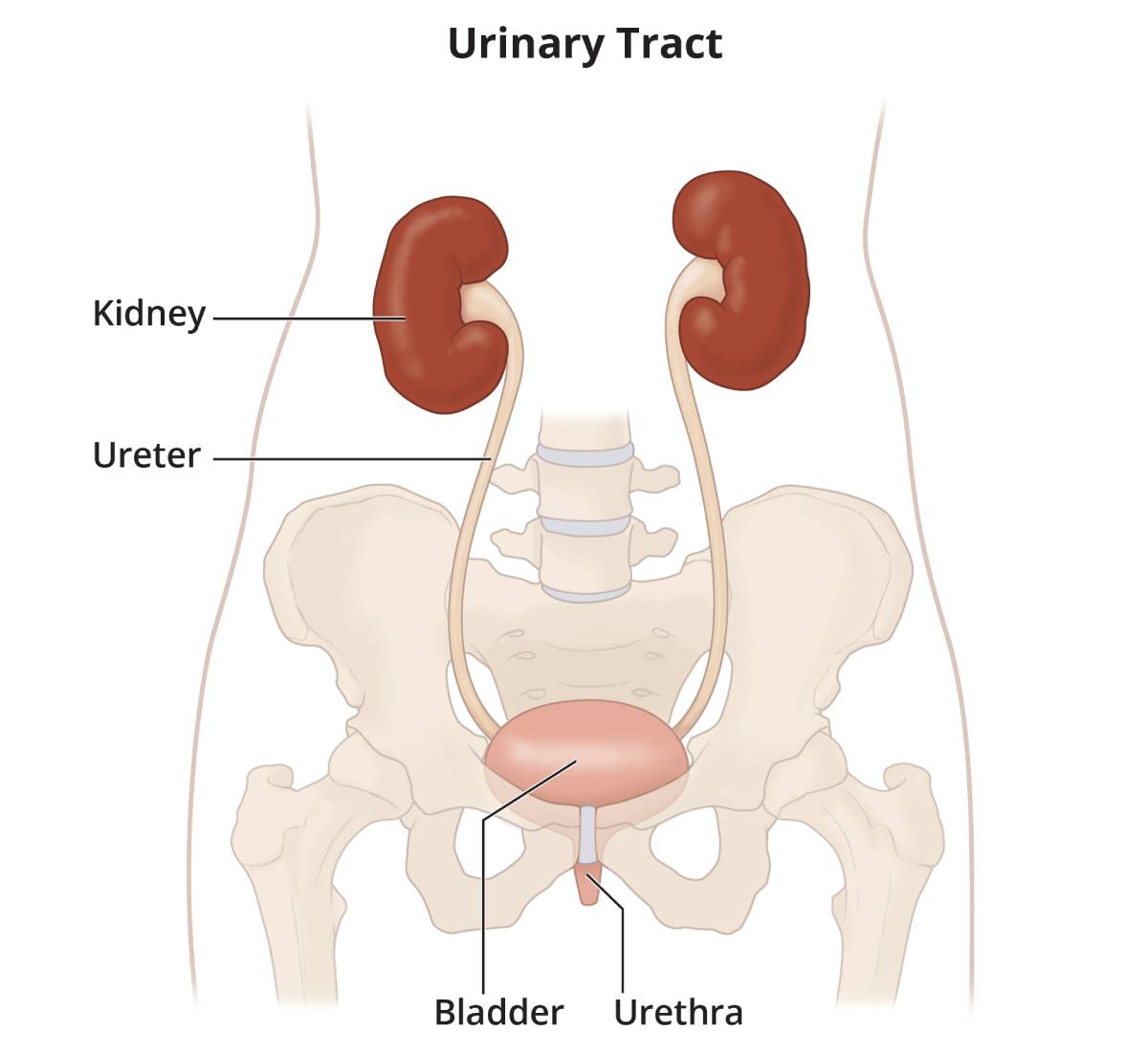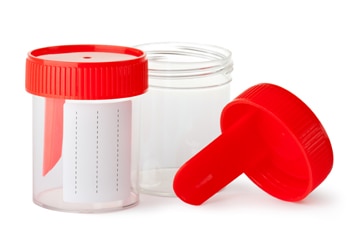Kidney Infection (Pyelonephritis)
Return to Overview PageDefinition & Facts
In this section:
- What is a kidney infection?
- How common are kidney infections?
- Who is more likely to develop a kidney infection?
- What are the complications of kidney infections?
What is a kidney infection?
A kidney infection is a type of urinary tract infection (UTI). Most kidney infections are caused by bacteria or viruses that first infect your lower urinary tract, usually your bladder. Then, the infection moves up your ureters to one or both of your kidneys. The kidneys are part of the upper urinary tract. Kidney infections can be very painful and cause serious health problems.
If you have symptoms of a bladder infection, see a health care professional. You may need treatment to prevent the infection from spreading to your kidneys.

Does kidney infection have another name?
A kidney infection is also called pyelonephritis.
How common are kidney infections?
Kidney infections lead to about 250,000 office visits and 200,000 hospital admissions in the United States each year.1
Who is more likely to develop a kidney infection?
 Kidney infections are more common in females than males and are common during pregnancy.
Kidney infections are more common in females than males and are common during pregnancy.
You are more likely to develop a kidney infection if you
- are female
- have a current or recent bladder infection
- are pregnant
- have a urinary tract blockage, such as a kidney stone or enlarged prostate
- have a urinary tract problem such as vesicoureteral reflux, which is more common in children
- have diabetes or problems with your immune system
- have a spinal cord injury or nerve damage around the bladder
- have trouble emptying your bladder completely, called urinary retention
What are the complications of kidney infections?
When diagnosed early and treated properly, most kidney infections don’t lead to complications. In rare cases, kidney infections may cause
- high blood pressure
- kidney failure
- kidney scarring, which can lead to chronic kidney disease
- sepsis
Your chance of a complication is slightly greater if you
- are male
- are older or frail due to weakened strength or other problems of aging
- are pregnant
- have a problem with the structure of your urinary tract
- have had repeat kidney infections
- have certain health conditions, such as diabetes, kidney disease, or sickle cell disease
- have a weakened immune system or have had an organ transplant
Reference
Symptoms & Causes
What are the symptoms of a kidney infection?
 Symptoms of a kidney infection may include fever and chills, frequent or painful urination, and nausea or vomiting.
Symptoms of a kidney infection may include fever and chills, frequent or painful urination, and nausea or vomiting.
Symptoms of kidney infections vary by age and may include
- fever and chills
- cloudy, dark, bloody, or foul-smelling urine
- frequent, painful urination
- pain in your back, side, or groin
- nausea or vomiting
Children younger than age 2 years with a kidney infection may only have a high fever. They may also show signs of feeding difficulty and poor weight gain.
When should I seek a health care professional’s help?
Seek care right away if you have kidney infection symptoms. Although uncommon, a kidney infection could lead to sepsis, which can be life threatening.
Symptoms of sepsis may include
- fever and chills
- confusion
- rapid breathing and heart rate
- severe pain or discomfort
- shortness of breath
What causes a kidney infection?
Bacteria in your upper urinary tract are often the cause of kidney infections. Viruses are a less common cause.
Most kidney infections start as a bladder infection in your lower urinary tract. Bacteria that live in your bowel can get into your urinary tract and cause an infection. If a bladder infection isn’t treated or doesn’t go away, it can spread to one or both kidneys.
Normally, the body keeps bacteria in the urinary tract in balance. Emptying your bladder, or urinating, is one way the body helps keep a healthy number of bacteria in your bladder.
In some cases, your blood may carry harmful bacteria or viruses from another part of your body to your kidneys. Rarely, you might get a kidney infection after surgery.
Diagnosis
How do health care professionals diagnose a kidney infection?
Health care professionals use your medical history, a physical exam, and lab and imaging tests to diagnose a kidney infection. Your health care professional will ask if you have a history of health conditions that make you more likely to develop a kidney infection.
During a physical exam, your health care professional will ask about your symptoms. If you are male, your exams may include a digital rectal examination (DRE). During a DRE, your health care professional will check for a swollen or enlarged prostate. An enlarged prostate can lead to a urinary tract infection.
What tests do doctors use to diagnose a kidney infection?
Health care professionals may use urinalysis, urine culture, and imaging tests to diagnose a kidney infection.
Lab tests
Urinalysis
 You may be given a collection cup to provide a urine sample for lab tests.
You may be given a collection cup to provide a urine sample for lab tests.
Urinalysis checks your urine sample for blood in the urine and white blood cells. Your body produces white blood cells when it is fighting an infection caused by bacteria.
Urine culture
Urine culture identifies some common types of bacteria in your urine. This test may help to see whether antibiotics are a treatment option. You will typically get your test results in a few days.
Blood tests
Blood tests look for serious infections, such as kidney infections. Blood tests may also show how well your kidneys are working.
Imaging tests
Your health care professional may use one or more of the imaging tests below to help diagnose a kidney infection
- computed tomography (CT) scan, which uses x-rays and computer technology to create images of your body’s internal organs
- magnetic resonance imaging (MRI), which takes pictures of your body’s internal organs and soft tissues without using x-rays
- radionuclide scan, which uses a small amount of radioactive material and computer technology to see how your organs are working
- ultrasound, which uses sound waves to create an image of your organs
Treatment
How do health care professionals treat kidney infections?
 If you think you have a kidney infection, see a health care professional right away.
If you think you have a kidney infection, see a health care professional right away.
If you have a kidney infection caused by bacteria, your health care professional will prescribe a general antibiotic. Your health care professional may adjust your antibiotic based on your lab results. You may take antibiotics by mouth, receive them through an intravenous (IV) line, or both.
If you are very sick from your kidney infection, you may go to a hospital. A health care professional may give you IV fluids.
Sometimes, a urinary tract blockage, such as a kidney stone or an enlarged prostate can cause a kidney infection. You may need surgery or another procedure to treat the blockage.
What happens if my infection comes back?
You should see your health care professional right away if your symptoms return after you’ve completed treatment. Your health care professional may order another urine culture or do imaging tests. If your tests show you have an infection, your health care professional may prescribe different antibiotics or antibiotics for a longer time.
How can I prevent a kidney infection?
Many kidney infections start as bladder infections. Scientists are still trying to understand the best ways to prevent bladder infections. Small changes in your daily habits to maintain hygiene and keep your urinary tract healthy may help.
You can help keep your urinary tract healthy by
- drinking enough liquids
- developing healthy bathroom habits, including wiping front to back
- using the bathroom when you feel the urge to urinate
- taking the time to fully empty your bladder when urinating
If you think you have a bladder infection, or if you have an infection that seems to be getting worse, contact your health care professional.
Eating, Diet, & Nutrition
How can my diet help prevent or relieve kidney infections?
 Drink lots of liquids to help prevent UTIs, including kidney infections. Water is best.
Drink lots of liquids to help prevent UTIs, including kidney infections. Water is best.
Experts don’t think your diet can help prevent or treat kidney infections. Some research says that cranberry products may help prevent urinary tract infections (UTIs), but there isn’t enough evidence to be sure.2
For safety reasons, talk with your health care professional before using dietary supplements, such as vitamins, or any complementary or alternative medicines or medical practices.
Can drinking liquids help prevent or relieve kidney infections?
Drinking enough liquids can keep you hydrated and help prevent or relieve UTIs, including kidney infections. Water is best.
Reference
Clinical Trials
NIDDK conducts and supports research into many diseases and conditions, including urologic diseases. The trials look to find new ways to prevent, detect, or treat disease and improve quality of life.
What are clinical trials for kidney infection
Clinical trials—and other types of clinical studies—are part of medical research and involve people like you. When you volunteer to take part in a clinical study, you help doctors and researchers learn more about disease and improve health care for people in the future.
Researchers are studying many aspects of kidney infection, such as
- ways to manage repeat infections
- different types of antibiotic treatments and how long they last
- new ways to diagnose infections
Find out if clinical studies are right for you.
Watch a video of NIDDK Director Dr. Griffin P. Rodgers explaining the importance of participating in clinical trials.
What clinical studies for kidney infection are looking for participants?
You can view a filtered list of clinical studies on kidney infection that are federally funded, open, and recruiting at ClinicalTrials.gov. You can expand or narrow the list to include clinical studies from industry, universities, and individuals; however, the National Institutes of Health does not review these studies and cannot ensure they are safe for you. Always talk with your health care provider before you participate in a clinical study.
This content is provided as a service of the National Institute of Diabetes and Digestive and Kidney Diseases
(NIDDK), part of the National Institutes of Health. NIDDK translates and disseminates research findings to increase knowledge and understanding about health and disease among patients, health professionals, and the public. Content produced by NIDDK is carefully reviewed by NIDDK scientists and other experts.
NIDDK would like to thank:
Megan S. Bradley, M.D., University of Pittsburgh School of Medicine

